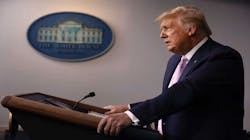Trump says some drugmakers face a 100% pharma tariff on October 1
In his latest push to onshore drug manufacturing to the United States, President Donald Trump in a Sept. 25 post on Truth Social said that starting Oct. 1 his administration will impose a 100% tariff on any branded or patented pharmaceutical product, unless the drugmaker “is building” their plant in the U.S.
Trump in the posting wrote that “IS BUILDING” is defined as “breaking ground” and/or “under construction” with “no Tariff on these Pharmaceutical Products if construction has started.”
John Crowley, CEO of the Biotechnology Innovation Organization, issued a statement on Friday regarding the potential for 100% tariffs on branded or patented medicines.
“The immediacy of punitive, 100% tariffs on innovative medicines for any company without ‘shovels in the ground’ would devastate our nation’s small and mid-sized biotechnology companies,” Crowley said. “These 3,000+ companies are the heart and soul of America’s vitally important biotechnology industry. Most of these companies do not have access to the significant capital needed to immediately establish manufacturing in the US. Due to the complexity and capital-intensive nature of biomanufacturing, the vast majority of these small-to mid-size biotech innovators rely on contract manufacturers to produce their medicines.”
Last month, Trump threatened in an interview with CNBC to impose tariffs as high as 250% on pharmaceuticals imported to the U.S. In July, Trump said he would impose a 200% pharma-specific tariff, as part of his strategy to pressure drugmakers to increase domestic manufacturing, while providing a grace period of up to a year and a half to give manufacturers the opportunity to move their operations to the U.S.
“On the one hand, the 100% tariff comes below the previously suggested 200%-plus tariffs, but it also comes after the established EU trade agreement (15% tariff) and the $350 billion in announced investments in the United States by pharmaceutical companies,” William Blair analysts wrote in a Friday note to investors.
The analysts commented that the “stage of these manufacturing projects is largely unknown, but we believe overall these include ongoing and planned activities (many having been already planned before the recent press releases).” At the same time, they said “there remain considerable questions about how a potential tariff would be applied, such as to key pharmaceutical ingredients, API, or finished product (the tweet specifically called out branded or patented pharmaceutical product).”
The Trump administration has launched an investigation into whether the importation of certain pharmaceuticals and pharmaceutical ingredients may threaten U.S. national security. The probe is looking into the extent to which domestic production can meet demand, the feasibility of increasing U.S. capacity for pharmaceuticals and pharmaceutical ingredients to reduce import reliance, and whether tariffs are necessary.
Leerink Partners analysts in a Thursday note to investors said that “many large-cap biopharmaceutical companies should not be exposed because they are engaged in some sort of U.S. facility construction activity, but it is difficult to predict which smaller U.S. biopharma companies may face exposure.”
At the same time, the analysts said Trump’s post “raises several questions, including: 1) is it a negotiating tactic related to the Section 232 investigation, since he previously stated that he would give companies 12-18 months to onshore manufacturing?; 2) How will ‘breaking ground and/or under construction’ be defined?; 3) Since many companies leverage U.S. contract manufacturing sites, how will outsourced facilities be treated?; and 4) Will Administrative action be durable and not reversed upon potential legal challenges?”
Still, the analysts concluded that the risk of tariffs has potential implications for the entire biopharmaceutical sector.
Ramnivas Mundada, director of economic research and companies at data and analytics firm GlobalData, said in a statement that the Indian pharmaceutical sector is bracing for significant changes.
“While the immediate impact on India’s core generic drug export business may be limited, as most generics are not directly targeted by these tariffs, significant risks remain,” Mundada said. “If the U.S. expands tariffs to encompass generic medicines in the future, it will directly affect India’s primary export category. Furthermore, Indian generic manufacturers, operating on thin profit margins, could find the U.S. market financially unviable if tariffs expand, potentially leading to reduced supply of affordable medicines.”
About the Author
Greg Slabodkin
Editor in Chief
As Editor in Chief, Greg oversees all aspects of planning, managing and producing the content for Pharma Manufacturing’s print magazines, website, digital products, and in-person events, as well as the daily operations of its editorial team.
For more than 20 years, Greg has covered the healthcare, life sciences, and medical device industries for several trade publications. He is the recipient of a Post-Newsweek Business Information Editorial Excellence Award for his news reporting and a Gold Award for Best Case Study from the American Society of Healthcare Publication Editors. In addition, Greg is a Healthcare Fellow from the Society for Advancing Business Editing and Writing.
When not covering the pharma manufacturing industry, he is an avid Buffalo Bills football fan, likes to kayak and plays guitar.
